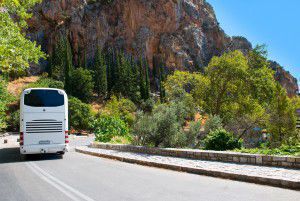The ups and downs of coming home
When you work abroad as an English as a foreign language teacher, coming home for the occasional visit and obligatory Christmas festivities means there are a number of things to look forward to. Personally custard, gravy and drinkable tap water are pretty high up on my list, but that’s just me. Friends, family, Wetherspoons breakfast… there are all sorts of things that beckon you and make home, home.
But there are also pitfalls, things you forget about and either take for granted or that have become so instilled, you don’t realise you are doing them.
Here’s a few of mine. Play snap?
Roads
No matter how many times I come back, I always get flummoxed by the roads. Left hand lane, right hand lane… I look both ways to prevent becoming a bug stain on a car bonnet every single time. And once I tried to get on the driver’s side of a National Express coach. The driver patted his knee and asked me if I’d like to drive. Possibly not…
Language
Yes, I should know better. But when I want to know the price of something I always find myself speaking in the language of the country from where I have just come – currently ¿Cuánto es? to check a price and perdona when I bump into someone. Which I do. A lot. Clumsy…
Customs
My first cafe visit on arriving back to England involved me trying to kiss a stranger. Not because I’m a floozy, but because I’ve just come from Spain, and the double kiss thing is part of my everyday greeting. Honest.
Manners
Someone sneezes, I say everything apart from bless you as a result of a number of different colds in a number of different cities. Thank you. Pardon. Would you mind…? Sorry. Sorry to inanimate objects like doors and trolleys. All the time. No wonder people outside of the UK have the mistaken impression that we are very, very polite.
 Price checking
Price checking
When you first go abroad you convert everything back into pounds, but when you come back here after an extended stay away, everything is automatically put back into euros (or whatever currency you know). Which makes every shopping trip an accounting adventure.
How much?!
Somewhat in the category of price checking I know, but hear me out. If you’ve gone from having a jarra of beer that is 1,50€ and you’re presented with a pint that is around £3-4, an outraged and indignant yell is likely to escape your lips without even a thought.
Lack of privacy
Families. They mean well. Of course they do. In theory. But it doesn’t matter your age or circumstances, when you return home to the ‘family nest’, you will be bombarded with questions (‘when are you settling down?’), misplaced praise (‘oh, you’re so brave to go off travelling’) or enforced schedules (‘we’ll have breakfast at 7, lunch at 1, and dinner at 7:30. And this is your itinerary for your stay.’) When you’ve been used to your own space and doing as you please when you feel like it, coming home can sometimes be a stifling experience.
Envy
Yes. People who hate their jobs and their lives will envy you. They will covet your lifestyle of devil-may-care and say things like ‘I don’t know how you do it’ whilst plucking one child from their knee while another is attached round their neck, telling you about their plans for decorating the living room and showing off their latest car. We don’t judge you for your lifestyle, settlers (well, we do, just… quietly), so why judge ours? And if you hate your job so much, leave. That’s what we did. Nothing magical.
Catching up on gossip
Even about people you don’t know. Especially about them. See, while we’ve been off living our lives, running between classrooms or students’ apartments, jumping from train to metro to bus and wondering if the GPS on our phones will ever kick in and be helpful, life has continued at home too. And somehow, even though we’ve not been told about events, we are automatically assumed to know about them. I personally blame Facebook for that.
Travel, demystified
For some people, planning a new work route is daunting, whether using a satnav, Google Maps, or an A-Z. And if you have to travel to another city for business, well. Brave new world. But when you travel a lot because of work, train stations, airports and maps no longer phase you, and neither does the prospect of getting lost. Living in another country makes you realise that getting lost is actually no bad thing, merely an unexpected adventure. After all. If Bilbo had taken the ‘correct’ path he was ‘supposed’ to, we’d never have even known of Hobbitty adventures, elven legends and secret kings. Life is in the adventure, is it not?
A moment of doubt
There is sometimes a moment. When you look around at all the people who were once a part of your daily lives, getting on and doing their thing, living a different existence, and you think… why can’t I do that? Why can’t I just stay in one place for an extended period and do the settling thing? And then the moment passes. Because settling isn’t for everyone. Mortgages, the 2.4 kids, and the family saloon in the driveway is really not for everyone. There is nothing wrong with either way of living. And after a week or two, or sometimes a day or two, the call of leaving comes screaming and you start looking longingly at planes overhead or twitching every time you pass a train station. Off you go, traveller. Time to depart again. Home (and gravy) will still be here when you get back.
Has anyone else had similar experiences when coming home from travelling? Or do you have any stories to add? We’d love to hear from you 🙂
Kelly
The Long And Winding Road… of Long Distance Bus Travel
If you’re on a budget or just want to indulge in a bit of thinking time, travelling across Europe by bus could be the thing for you. With numerous companies offering fantastic prices, it’s a wonder that more people haven’t partaken in this not-so-secret method of transport.
Based on two particular routes*, here are some ‘dos and don’ts’ from our own personal experience.
Checking In
If you are travelling from the UK, Victoria Coach Station insist on you being available to check in at least one hour before departure. From other countries it is usually around half an hour maximum.
Check in normally involves only showing your ticket or reference number, however in some places there will also be an additional check of your ID card or passport.
If you want to guarantee a window seat or that your luggage is on first, face the fact that you will have to queue. Embrace it. Or at least prepare some good music to dance to whilst waiting.
Luggage
Whilst coach companies are very generous and often overlook oversized luggage, don’t get too greedy. Luggage limits are usually around 25kg and it’s mostly okay to go over that – although not with your entire house. On a very recent trip one single traveller was furious that her guitar, record player, large holdall, large backpack, and two very large suitcases were deemed too much. Shocking.
On The Bus
Thankfully coach seats do not recline as much as plane seats might, but there will always be someone who believes they alone need all the body space and legroom that is/isn’t available.
Mind where you sit. If you’re someone who needs the toilet regularly then you have to weigh up the pros of being close to the toilet with the cons of constantly hearing the door slam and the toilet flush – amongst other things.
Also. Take tissue with you. The one solitary toilet roll that is often installed in coach toilets pretty quickly disappears, so if you need to use the facilities more than two hours into the journey, take your own supply.
Trips to the toilet in the middle of the night can either be a human assault course or a foot fetishist’s idea of heaven: those lucky enough to not have to share a seat will sprawl out as best they can, with feet both socked and bare blocking your way. Do what you will.
Take headphones or earplugs. You are guaranteed to have either one token unhappy child or one potentially unstable adult who feels the need to tell everyone their life story. Look busy. At all times.
A small blanket is a very good idea for the coach, no matter the season you travel in. There’s nothing worse than attempting to sleep as a contortionist might, when there’s a breeze coming in on your back or you are shivering.
If you board a bus that originates from the UK, and you happen to have a UK adapter/plug, guard it with your life. For once other unprepared passengers are aware of this little treasure, everyone will suddenly want to befriend you and ‘borrow’ it.
Regular Stops
When there is a stop, use the toilet. Whether you feel the urge or not. If nothing else it is an opportunity to wash your hands thoroughly as the sinks in coach toilets always seem to have the smallest trickle of water and very little soap.
Take plenty of change with you for the vending machines at service stations. Not only will this work out cheaper than buying a ‘proper’ coffee at every stop, you will also be pleasantly surprised by the range and quality of hot beverages available. Especially in France. May we recommend the vanilla cappuccino.
Crossing The Channel
Depending on the time of day, you will either face the claustrophobic challenge that is the Channel Tunnel, or walk around a ferry at your leisure for around an hour before trying to find your coach again at the last minute. The ferry feels much more civilised as you can lounge on sofas or pace up and down the deck, but the Tunnel is much faster.
Be prepared for long delays at the border. It can either take under half an hour to go through the two separate controls for France and England, or it can take two hours. It depends on if they feel like checking your luggage as well as your passports, if they want their sniffer dogs to check you over, and if your fellow passengers who need visas have filled in or need help with filling in their paperwork.
Pet Peeves And Pluses
The main pet peeve of long distance coach travel, it has to be said, are Those People. You know the ones. Those who feel that every single stop, be it to refuel or for the driver to change, is their own personal cigarette break. Those that when the driver says there is a 45 minute break, decide to casually stroll into the service station five minutes before departure and delay the coach with their hot drinks that the driver has clearly said are not allowed onboard. Those that are veterans of the journey and will not leave the driver alone for a moment, or will give the entire coach a loud, running commentary the entire route.
A big plus is the long stops when changing buses. Stopping in Paris for 3 hours gives you ample time to wander to the Eiffel Tower and Arc de Triomphe as well as popping into a patisserie for a cheeky pastry for your petit dejeuner.
It does have to be said though, at least in our experience, that the drivers make the journey. They are jolly, they tell bad jokes, and they cheer you on with gusto to encourage you to get through the border control quicker than their previous coach passengers. Definitely an added bonus that will make you smile.
Bus travel. It isn’t for everyone. But perhaps it is for you.
Kelly
One more plus from us: you’ll meet loads of interesting people on your bus journey. Why not download uTalk for iOS, so you’ll always know how to say hello, even if you’re from different countries?
*Budapest to London, via Eurolines, with a travel time of 26 hours and 45 minutes. Calling at: Győr, Vienna, Linz, Liege, Brussels, Ghent, Lille and Dover before terminating at Victoria Coach Station, London.
Barcelona to London, via Megabus, travelling for approximately 26 hours. Calling at: Toulouse, Brive, Paris and Amiens and terminating at Victoria Coach Station.
Supermarket Swipe
I’m a Morrisons kind of girl.
And when I look longingly into my box of Yorkshire Tea and see nothing but tealeaf dust, I miss it.
I miss a store layout I recognise. I miss being a ble to identify what things are without imaginative guess work and Google Translate. But most of all, I miss English products.
ble to identify what things are without imaginative guess work and Google Translate. But most of all, I miss English products.
When you are far from home and craving custard, and the mere pronunciation of the word ‘vanilla’ fills shop assistants with mirth, you too will experience saudade at the thought of your local supermarket. Because supermarkets abroad sell all manner of things that you would not expect to find. And asking for help when you aren’t exactly sure what you’re asking for is everything from embarrassing to adventurous.
It’s tricky out there.
My fellow Brits abroad: on returning home, don’t be surprised if you feel the sudden urge to run into your nearest supermarket and pull the fishmonger into a tight embrace. Just make sure he doesn’t have a fish filleter in his hand when you do.
Still, never let it be said that there aren’t delightful discoveries to be made Out There. Here is a selection of my own that I haven’t yet decided if I am looking back on with fright or fondness.
China
China might be a bit of an outlier in the joy of supermarket shopping. The ones I went to were the full several-floor ‘we sell everything you can think of and probably some things you have nightmares about’ flavour, with counters offering up an array of unknowns and unidentifiables.
If you are an avid coffee drinker, it might be wise to take a stash of your own. Those crimes-against-coffee all-in-one sachets of coffee, milk powder and sugar are enough to make any coffee aficionado turn and weep.
Something that truly delighted me in Chinese supermarkets (and yes. I am easily amused) was that you can buy milk in pouches. Rather than the cartons we are used to in the UK, milk here – and expect a wide variety of dairy, soya and rice milk – is often sold in these thick, plastic pouches that have a satisfying squishy feeling when you juggle them in your hands. Not that you should really do that. Unless you want an audience.
Hungary
 Hungary is the land of paprika and sour cream. Paprika comes in different strengths of spiciness and there are either ‘regular’ or ‘sweet’ varieties to choose from. Sour cream (tejfol) has all sorts of uses in both sweet and savoury dishes, and you can buy it in all manner of sizes – from the small cartons arranged like pots of fromage frais, to the litres of the stuff in containers the size of those value packs of magnolia paint at B&Q. (It is also apparently a very effective ‘after sun’, but I’m not sure about that.)
Hungary is the land of paprika and sour cream. Paprika comes in different strengths of spiciness and there are either ‘regular’ or ‘sweet’ varieties to choose from. Sour cream (tejfol) has all sorts of uses in both sweet and savoury dishes, and you can buy it in all manner of sizes – from the small cartons arranged like pots of fromage frais, to the litres of the stuff in containers the size of those value packs of magnolia paint at B&Q. (It is also apparently a very effective ‘after sun’, but I’m not sure about that.)
Supermarkets in Hungary are generally smaller than you may be used to at home, but they are pretty well stocked. For some reason, apples are on the pricey side, but the fact that you can buy cherries (both normal and sour, which are delicious) and all manner of berries for a fraction of the price you’d pay at home more than compensates. Another surprising thing is that Spar is an actual supermarket, rather than the emergency-chocolate-fix kind of place that I am used to.
Spain
 Pig legs. Whole pig legs, right down to hoof, are dangled from ceilings and fanned out on counters in enticing displays. This is not a delicacy, but an everyday food product that you will find in many a Spanish kitchen. Ham is so important to Spaniards you could say it is part of the culture. From jamón serrano to jamón york, and a whole spectrum in between, you will never be short of ham if you need it.
Pig legs. Whole pig legs, right down to hoof, are dangled from ceilings and fanned out on counters in enticing displays. This is not a delicacy, but an everyday food product that you will find in many a Spanish kitchen. Ham is so important to Spaniards you could say it is part of the culture. From jamón serrano to jamón york, and a whole spectrum in between, you will never be short of ham if you need it.
For those of you who like to bake, be prepared to make some product replacement choices. Butter and margarine is available here but since most cook and bake with oil instead, and pour oil on their toast in the morning, you might not find exactly what you were looking for.
Alcohol is incredibly cheap here, and very good quality. Good wine is pretty much a given, and when you can buy nice cava for under two euros, or a can of beer for less than 30 cents, you can wonder at how people aren’t walking around constantly merry all day long.
There is a huge range of disposable products in Spanish supermarkets, including napkins, tissues and kitchen roll. And plates, bowls and cups. They even have the ‘balloon’ glasses in plastic form, just in case you decide on a cheeky gin and tonic on an impromptu picnic.
Finland
Our last whistle-stop on the supermarket tour is in the beautiful Finland, with large supermarkets of enough content to satisfy even the most dithering of customers (me). There are more varieties of sausage here than I have ever seen in my life, delicious rye breads, and very good cheese and salami.
One thing that threw me a little was an ‘addition’ to the toilet tissue aisle that I hadn’t anticipated. Since Finland is the land of the sauna, and more importantly, the all-naked sauna, there are disposable sauna ‘tissues seats’ for you to sit on that you can purchase in multipacks, ready for your public sauna experience. If you have your own sauna, and what self-respecting Finn doesn’t, you should of course purchase your own special sauna ‘pad’, which comes in a range of covers, colours and thicknesses. It is a whole new world.
These items might seem like an odd collection of things, and in many ways they are. But on a day when all you want is the home comfort of knowing in which aisle to find a tin of beans, good tea bags, and a bakewell tart, the call of the home supermarket is strong. Especially the bakery aisle. Oh, how I miss the bakery aisle…
Kelly
A Hungry Conundrum
Learning a language is one thing… but what happens when that language changes depending where in the country you happen to be standing? That’s the subject of today’s blog post from Kelly – if you’ve encountered any of these regional confusions, we’d love to hear about them!
When is a roll a cake?
Before you break out your finest John Shuttleworth impression in fear of pudding before main, there is actually a very good answer to this.
Because unless you’ve never ventured further than your local shops and the thought of travelling to the next borough, town or neighbourhood fills you with a sense of dread, you’ve probably noticed that local words for things vary.
We don’t necessarily mean profound things like finding yourself receiving a chocolate biscuit when you asked for a custard cream (no complaint there really but still, confusing), but honestly, there is a minefield of potential outrage and disappointment out there if you’re not sure what you’re asking for.
Be careful where you ask for a ride, for example.
Back to our conundrum.
Escaping the Smoke
 When I left that there London many years ago from the pigeon-infested Victoria Coach Station on a one-way journey to Yorkshire, I’m pretty sure in my possession was a copy of Kerrang, a selection of confectionary, and a bread roll containing cheese and pickle.
When I left that there London many years ago from the pigeon-infested Victoria Coach Station on a one-way journey to Yorkshire, I’m pretty sure in my possession was a copy of Kerrang, a selection of confectionary, and a bread roll containing cheese and pickle.
Somewhere along the M1 that innocent-sounding sandwich was eaten, but had it remained intact, a magical thing would have happened to it. For on the journey North, it would have transformed from a roll, to a batch, to a cob, perhaps to a scuffler (I forget the exact National Express route…) before finally settling on being a breadcake.
In Britain, even wheat-based products have identity crises.
How do you say…
English is a diverse language for both native and non-native speakers alike, but think how much more embarrassing it is for a native speaker not being able to order something in their own country in their own tongue. We normally reserve such ridicule for when we travel abroad unprepared, in the arrogant but not-so-naive knowledge that English is spoken everywhere. But on our own doorstep, a quick weekend away can mean an unwanted education in local colloquial vocabulary.
Perhaps it would be easier to stick to the tourist move of pointing at the menu and blinking mutely.
 Another area of confusion could be the names for mealtimes. There is a fond memory of a misunderstanding over tea and dinner time. An offer of tea to a friend was met with an expectation of milk, sugar, and possibly biscuits, but when the option presented was tuna and sweetcorn, it was rapidly declined. With a horrified expression that said, ‘who are you people? What are you doing to the sanctity of the cup of tea???’, a friendship was on the brink. Because breakfast, lunch and dinner can also be breakfast, dinner and tea, depending where you are in our humble isle. (The tuna and sweetcorn was for a jacket potato, in case you were wondering).
Another area of confusion could be the names for mealtimes. There is a fond memory of a misunderstanding over tea and dinner time. An offer of tea to a friend was met with an expectation of milk, sugar, and possibly biscuits, but when the option presented was tuna and sweetcorn, it was rapidly declined. With a horrified expression that said, ‘who are you people? What are you doing to the sanctity of the cup of tea???’, a friendship was on the brink. Because breakfast, lunch and dinner can also be breakfast, dinner and tea, depending where you are in our humble isle. (The tuna and sweetcorn was for a jacket potato, in case you were wondering).
And another thing…!
While we’re on our home-away-from-home soapbox, can we take this opportunity to complain about the options available for a ‘pattie’ in your local fish and chip shop? Because again, depending on where you go, this could be fish, potato, fish and potato, potato in a mixture resembling bubble and squeak… There are probably more variations too, and one place we really don’t want to be confused is our chippy. Next you’ll be debating if the perfect side is mushy peas, curry sauce or gravy, and it’s all too delicate a subject for us to deal with without serious, in depth thought. To quote Hot Pie, “you cannot give up on the gravy.”
See? Now look what’s happened. We’re hungry and we want pie. But when is a pie not a pie?
That’s it. Time for a pub lunch.
Wetherspoons, anyone?
Kelly
Helping yourself to learn a language
Before launching into an ‘only teacher knows best’ tirade, which would sound incredibly biased as I am a language teacher myself, I would like to open with the statement that self-study is an essential part of learning a language. What happens in your classroom or with your private tutor is a good start, but anyone who tells you that this is all you have to do to learn a language is telling you a lie. Sorry about that.
 Classes are a great experience, yes, but like any new skill you want to learn, it is best to approach learning from many angles. There is no point having one lesson a week and then doing nothing at all, or, even more sinful, leaving that homework you promised yourself you would do until the night – or hour – before your next lesson. You are wasting your time and money, and yes. Us teachers can tell.
Classes are a great experience, yes, but like any new skill you want to learn, it is best to approach learning from many angles. There is no point having one lesson a week and then doing nothing at all, or, even more sinful, leaving that homework you promised yourself you would do until the night – or hour – before your next lesson. You are wasting your time and money, and yes. Us teachers can tell.
Having gone down the self-learning route myself, I’ve come across some resources I’d love to share with you.
Take for example things like Livemocha. A good all-round resource that is set up to partner you up with other language learners through language exchange, short online lessons, and lots of forums. It’s interactive, there’s always something new, and it’s free. What’s not to love?
If you don’t want to concentrate specifically on language learning and are looking for more of a language exchange/international vibe, Interpals could be the place for you. This site is a bit like a mix between Facebook and InterNations, so treat it with the same joy or disdain you do either of them. There are amazing connections to be made out there but then again there are also many to sever. Choose your friends wisely and never be afraid to use the block button with flair.
Not sure you’re ready for full-on instant message conversations just yet? Something like mylanguageexchange.com might be what you need. While both text and voice chat options are available, what I really like about this is the penpals who are happy to write either by email or even by traditional snail mail. Gifts in the post. Need I say more?
Another tool that is well worth trying is EuroTalk’s interactive series, Talk Now. This is a really easy way to pick up a good vocabulary base and I like the exposure to a lot of different accents. Yes, it is ‘staged’ because it’s a course, but if you’re concerned about who you’re speaking to out there or want to get confident first so that you can tell those with ulterior motives to ‘go away’ with perfect pronunciation, it really is a good investment.
As far as mobile apps go, I like Memrise for its simplicity. It’s sort of a drip-feed method of learning: you learn a series of words and there are ‘helpful’ memes sent in by users – I say ‘helpful’ because some really are helpful, some are hilarious so they just make you giggle, and some make you question the human race.
 Finally, there’s uTalk. This is a great time killer. All those moments sat waiting for the metro or in my case, waiting for students to finish their meetings when our lessons are due to start, can now be filled with quick and easy games to help you learn your desired language. Put down the Candy Crush, step away from the Jurassic Park Builder and pick up some new words!
Finally, there’s uTalk. This is a great time killer. All those moments sat waiting for the metro or in my case, waiting for students to finish their meetings when our lessons are due to start, can now be filled with quick and easy games to help you learn your desired language. Put down the Candy Crush, step away from the Jurassic Park Builder and pick up some new words!
Now, all these resources are tailored specifically towards learning a language. But there are other, more natural ways of learning.
Watching films in your target language but with English subtitles is an excellent way to learn, as is listening to real local radio – TuneIn is fantastic for this as it lets you search by locations the world over.
Find out about typical newspapers. In my case I used Helsingin Sanomat and found this from a quick Wiki search for ‘popular newspapers in Finland’. There will likely be an online version of your chosen paper and if you get stuck with translating you can either translate the entire page depending on your browser choice, or copy and paste the article directly into Google Translate.
Translate Eurovision entries, listen to commentary of your favourite sport in another tongue, embrace the possibility that there are songs out there in other languages that you will love – then translate and learn them by heart.
Changing the language of your social media and phone will also help, but that is for the brave and sure. Do this only if you’re confident you know enough of the language to avoid embarrassing mistakes.
Last of all, if you get the opportunity to speak, speak. If you overhear someone talking in the language you are learning, don’t be afraid to go over and say hello. Yes, perhaps you’ll startle them. But in my experience, it is just shock that a native English speaker has taken the time to bother to learn their language at all. Their first question to you will probably be ‘why are you learning…..?’
There are a million ways to learn. Try some 🙂
Kelly




